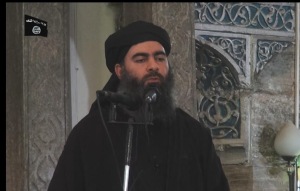A flow of responses swept across the Middle East after the militants of the Islamic State of Iraq and the Levant (ISIL) declared a caliphate in northern Iraq in late June. This news was taken rather negatively by the regional spiritual circles and scientists.
The fatwas issued by the Iraqi imams ordered the faithful Muslims to refrain from any contacts with the self-appointed caliph Abu Bakr al-Baghdadi. The respected scientists of the Al-Azhar Muslim University in Cairo called this step of the ISIL a “childish case of misbehavior”, the Ministry of Islamic Affairs of Saudi Arabia on the other hand promised that it would show the true face of the “sham caliph.”
The representatives of the major Islamic movements – the Sunnis and Shiites preferred to distance themselves from the new “master of Iraq.” The leader of the Tunisian Nahda Party Rashid al-Ghannushi called the declaration of a caliphate a reckless step, that would provoke confusion among the people.
It’s true that the future of political Islam is seen by many as an ideal caliphate state. Originally a theocratic Muslim empire reached the peak of its power in 8-9 century AD, when it was stretching from the Pyrenees to India and even dominated the then Europe. The heritage of this “golden age” of Islam is inspiring a lot of imams and Muslim politicians today that strive to overcome the challenges of the modern era, attain the fruits of progress and restore the former power of the Arabs.
The declaration of a new caliphate, according to Middle Eastern observers has put Islamists in front of a difficult choice. Should they swear their allegiances to this new lord or not, the latter choice is putting them into a conflict with their own ideological dogmas and their supporters.
For instance, the Al-Tahrir Islamist party which is believed to accept no compromise in anything that concerns the possible creation of a new caliphate, rejected the actions of Abu Bakr al-Baghdadi. A similar reaction came from a number of branches of the the Muslim Brotherhood Islamic group.
This step provoked talks about a new major split in the ranks of jihadists and Salafists. Arabic TV channel Al Arabiya has pointed out a deep and sometimes bloody conflict between the new caliphate and a number of congenial Islamist organizations, such as Jabhat al-Nusra and smaller groups.
Note that the driver of these events the Islamis State of Iraq and the Levant is unleashing the fire of fratricidal war in the very heart of the Arab world, in Syria and Iraq. And all this against the background of what is happening now in Gaza.
A striking example of the new ways of the Islamists is the recent destruction of the house of Sheikhs of a large Arab tribe of Al-Ubaid that was located near the city of Kirkuk.
Eyewitnesses say that the caliphate militants are demanding the local elite to swear allegiances to the new authorities, moreover they are demanded to get involved in the kidnapping business and other crimes. Should a person refuse his house is getting mined and demolished and he is usually executed.
What will be the scope of this recent outbreak of violence and will it cause new murids to come to Iraq in order to fight under the black banner of the Caliphate – these are the questions that no one can answer.
It’s most likely that those who cannot get out of poverty, suffering from oppression or just lost hope will join the ranks of a new army of the caliph.
“It is an escape to history, from poverty, alienation, oppression and foreign occupations.” – said Ramzy Baroud a prominent Palestinian political analyst, a PhD scholar at the University of Exeter (UK), who spent his childhood in Gaza.
It would be wrong to understate the dangerous consequences of this phenomenon, observers say. They believe that the largest Islamist groups that are close to the Al Qaeda are unlikely to immediately join the new caliphate. But the longer its fighters will fight the Iraqi army, the more attention they will attract.
Many experts and bloggers pay attention to the influential external factors of the current scenario in the aftermath of the US-led invasion of Iraq in 2003. It brought the country to ruin, destroyed the status quo that had been prevailing among the various ethnic groups and factions, which led to the collapse of the state and the subsequent legal vacuum.
All this has flung the Pandora’s box open, which brought the radical elements to the forefront. The atmosphere of temporary tactical alliances that were concluded by the opposing forces created an atmosphere in which those destructive forces were free to operate under different masks, including the one of a “new caliphate”.
Yuri Zinin is a Senior Research Fellow at MGIMO and a columnist for the online magazine “New Eastern Outlook”.

